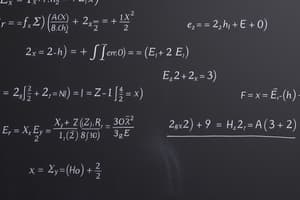Podcast
Questions and Answers
Which system of partial differential equations forms the Cauchy-Riemann equations?
Which system of partial differential equations forms the Cauchy-Riemann equations?
- $$\frac{\partial u}{\partial x} = -\frac{\partial v}{\partial x}$$ and $$\frac{\partial u}{\partial y} = -\frac{\partial v}{ \partial y}$$
- $$\frac{\partial u}{\partial x} = -\frac{\partial v}{\partial y}$$ and $$\frac{\partial u}{\partial y} = \frac{\partial v}{\partial x}$$
- $$\frac{\partial u}{\partial x} = \frac{\partial v}{\partial x}$$ and $$\frac{\partial u}{\partial y} = \frac{\partial v}{\partial y}$$
- $$\frac{\partial u}{\partial x} = \frac{\partial v}{\partial y}$$ and $$\frac{\partial u}{\partial y} = -\frac{\partial v}{\partial x}$$ (correct)
What are the basic properties of analytic functions?
What are the basic properties of analytic functions?
- Divergence and curl properties
- Maximization of entropy and minimization of potential energy
- Preservation of angles and uniqueness of analytic extensions (correct)
- Conservation of energy and momentum
In a complex function, what does $$f(z) = u(x, y) + iv(x, y)$$ represent?
In a complex function, what does $$f(z) = u(x, y) + iv(x, y)$$ represent?
- Imaginary part of the function
- Polar form of the function
- Complex form of the function (correct)
- Real part of the function
What condition do analytic functions satisfy?
What condition do analytic functions satisfy?
If a function $$f(z)$$ is analytic, what property do the level curves $$u = c$$ and $$v = c$$ exhibit where they intersect?
If a function $$f(z)$$ is analytic, what property do the level curves $$u = c$$ and $$v = c$$ exhibit where they intersect?
When does the original function have an analytic extension to a larger domain?
When does the original function have an analytic extension to a larger domain?
Which type of function is an example of an analytic function?
Which type of function is an example of an analytic function?
How can the Cauchy-Riemann equations be used to determine if a function is analytic?
How can the Cauchy-Riemann equations be used to determine if a function is analytic?
What does it mean for a function to be analytically continued to a point in the complex plane?
What does it mean for a function to be analytically continued to a point in the complex plane?
Under what condition will a function's partial derivatives satisfy the Cauchy-Riemann equations?
Under what condition will a function's partial derivatives satisfy the Cauchy-Riemann equations?
Which of the following functions is an example of an analytic function according to the text?
Which of the following functions is an example of an analytic function according to the text?
What property do analytic functions possess with respect to their behavior in the complex plane?
What property do analytic functions possess with respect to their behavior in the complex plane?
Study Notes
Understanding the Relationship Between Analytic Functions and Cauchy-Riemann Equations
The Cauchy-Riemann equations are a fundamental concept in complex analysis, providing a necessary and sufficient condition for a function to be differentiable in the complex sense. These equations consist of a system of two partial differential equations:
- $$\frac{\partial u}{\partial x} = \frac{\partial v}{\partial y}$$
- $$\frac{\partial u}{\partial y} = -\frac{\partial v}{\partial x}$$
where $$f(z) = u(x, y) + iv(x, y)$$ is a complex function.
Analytic Functions and Cauchy-Riemann Equations
Analytic functions, also known as holomorphic functions, are those that satisfy the Cauchy-Riemann equations. These functions are important in complex analysis because they allow for the application of powerful tools and techniques, such as the Cauchy-Riemann equations, to study their properties and behavior. Some basic properties of analytic functions include:
-
Preservation of angles: If a function $$f(z)$$ is analytic, then the level curves $$u = c$$ and $$v = c$$ are orthogonal where they intersect.
-
Uniqueness of analytic extensions: If a function $$f(z)$$ is analytic in a simply connected domain and has an analytic extension to a larger domain, then the original function was already defined in the larger domain.
-
Analytic continuation: If a function $$f(z)$$ is analytic in a domain $$D$$, then it can be analytically continued to any point in the complex plane that can be reached from a point in $$D$$ by analytic functions.
Examples of Analytic Functions
Some examples of analytic functions include:
- Constant functions: $$f(z) = c$$, where $$c$$ is a constant (allowed to be complex).
- Exponential functions: $$f(z) = e^z$$.
- Logarithmic functions: $$f(z) = \log z$$ (defined on a suitable domain).
Solving the Cauchy-Riemann Equations
The Cauchy-Riemann equations can be used to determine if a function is analytic by checking if the partial derivatives of the real and imaginary parts of the function satisfy the equations. If the equations are satisfied, then the function is analytic. Conversely, if a function is analytic, then its partial derivatives will satisfy the Cauchy-Riemann equations.
In summary, the Cauchy-Riemann equations are a crucial tool in complex analysis for understanding the relationship between analytic functions and their properties. They provide a way to determine if a function is analytic and, conversely, if a function is analytic, they can be used to study its behavior and properties.
Studying That Suits You
Use AI to generate personalized quizzes and flashcards to suit your learning preferences.
Description
Test your knowledge about the fundamental relationship between the Cauchy-Riemann equations and analytic functions in complex analysis. Explore concepts such as preservation of angles, uniqueness of analytic extensions, analytic continuation, and examples of analytic functions.




